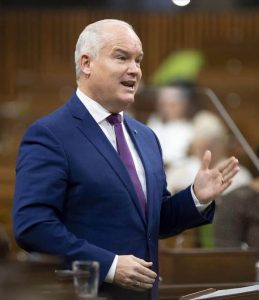
He almost could not speak, the response around him seemed overwhelming. But he finally raised his hands in gentle protest to the standing ovation and when the applauding stopped he offered these words:
“Today, I rise for the last time in this chamber,” MP Erin O’Toole said in the House of Commons on June 12. “It’s been the honour of a lifetime to serve Durham in Parliament.”
I have never been a card-carrying member of any political party. Despite what some may infer from my columns, I do not publicly espouse one political philosophy, party or individual over another. I hold no formal membership with any political party. I spend as much of my time as possible reading, watching, listening to sources that present as wide an array of news and information as I can find.
That’s why I paid close attention to Erin O’Toole, the former leader of the Conservative party of Canada, when he offered his final observations and comments in the House of Commons this month. It was not a quiet good-bye.
“Performance politics is fueling polarization,” he told fellow party members and opponents alike. “Virtue-signalling is replacing discussion and far too often we’re just using this chamber to generate clips, not to start national debates.”
Erin O’Toole indicated several months ago that he’d decided to retire from federal politics after 11 years as MP, including service as Minister of Veterans Affairs in the Stephen Harper cabinet, and from 2020 to 2022 as leader of the Conservative Party of Canada. (Disclosure: Erin O’Toole and I frequently shared public forums over the past decade, campaigning for the rights of veterans and raising public awareness for servicemen and women and first responders who’ve suffered psychological stress wounds.)
In many ways, the military and political veteran delivered his best shots in parting. He praised his family, his military comrades, his political allies for their support and confidence. But he worried about the elephant in the room.
“Instead of leading, instead of debating our national purpose in this chamber, too many of us are chasing algorithms down a sinkhole of diversion and division,” O’Toole said in the House.
Interesting timing and insight on his part, I suggest. Not just in Canada but globally, social media – Facebook, Twitter, Instagram, etc. – have made fortunes by snippet-gathering, regurgitating and digitizing product to grab our attention, in place of traditional means of information delivery – radio, television, newspapers, magazines, film documentaries and books. In other words, social media platforms have become content “aggregators,” accumulating news and information however they can, as fast as they can, as ear and eye candy.
They then judge success based on the number of “friend” requests they generate, not for the thoroughness, balance or accuracy of their content. In his Commons speech, Erin O’Toole alluded to the current reality.
“We are becoming elected officials who judge our self-worth by how many ‘likes’ we get on social media, but not how many lives we change in the real world,” he said in the House.
Not just among the politicians of Western democracies, but everywhere one looks, the consumption of traditional sources of news-gathering, reporting, editing and delivery has shifted to social media. Latest research suggests that almost half of Americans (and likely Canadians) use social media as a primary news source, particularly among the young.
What young social media users (and far too many adults) don’t consider is that most social media platforms allow individuals without professional journalistic backgrounds (but more likely with agendas) to gather and distribute mostly subjective views as factual news.
Of late, some mainstream media news outlets (in Australia, Europe and Canada) have fought back, over the use and abuse of their content, challenging social media giants where they hurt most – their pocketbooks – to pay for the news they download from (financially struggling) radio, TV, and newspaper websites for free.
That way, professionally researched and vetted news will be compensated and consumed. Indeed, just before the House of Commons rose for the summer, Canadian Parliamentarians passed Bill C-18 requiring tech companies to pay for news content (originating in Canada) that they share for free on their platforms.
In response, Meta, Facebook’s and Instagram’s parent corporation, has threatened to block news sharing of its content (including news publishers and broadcasters) to Canadian users.
Is this enough to chase fake news from the Internet and promote informed thought among Canadians? In his farewell address, MP Erin O’Toole offered this sobering view of a future dominated by social media’s view of the world.
“If we’re not careful,” he warned, “there soon will be a generation of voters that has never even heard a point-of-view different from their own.”